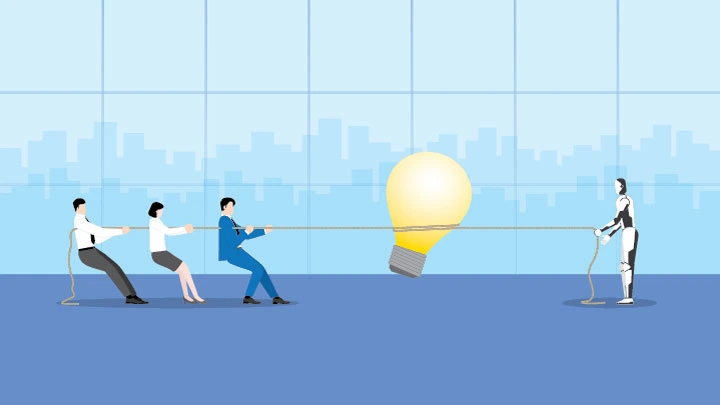
1. What is the Buzz?
With the advent of Industry 4.0, there have been many trending words being thrown around that the ordinary IP or business owner on the Malaysian street might be swept away by the hype without a clear understanding of the impact and implications. Four of the big terms and their general definitions are:
Artificial intelligence (AI): the theory and development of computer systems that are able to perform tasks normally requiring human intelligence, such as visual perception, speech recognition, decision-making, and translation between languages.
Generative AI: a type of artificial intelligence technology that can produce various types of content, including text, imagery, audio and synthetic data.
Blockchain: a system in which a record of payments made in cryptocurrency is maintained across several computers that are linked. (Please see the corresponding article in this newsletter for more information.)
Metaverse: a single, shared, immersive, persistent, 3D virtual space where humans experience life in ways they could not in the physical world.
2. Intellectual Property
The IP arena is always the first (out of necessity and being hard-pressed) to keep up with regulating the most recent technological advancements but there is much work and law reforms to be done. For one, our Patents Act 1983 and Patents Regulations 1986 do not define who is an ‘inventor’ but since a patent application with MyIPO requires the personal identification of an inventor or a signed written declaration is compulsory where the inventor is anonymous, this could imply that an inventor must be a natural person.
The terminology used in the Copyright Act 1987 seems to cover the rights of natural (human authors) and legal persons (human and corporate owners) only and thus unless AI is given some legal recognition, it is debatable whether AI-produced works are copyrighted, who is the rightful owner, duration of copyright protection in view of the perpetual subsistence of AI (versus limited lifespan of a human author) and if an AI author can enjoy moral rights under our traditional copyright laws.
3. Liability
As hardworking as a computer may be, there is a question on the placement of liability when there is finally a breakdown in an AI software or issues of quality, fitness for purpose, etc. This would fall back on the severity of the non-compliance with the warranties made to the consumer and thus could be governed by the Contracts Act 1950 and Sale of Goods Act 1957. OpenAI, the software developer of the popular ChatGPT has explicitly disclaimed all liabilities and any possible claims made against them for any possible factual inaccuracies in the work generated by its AI.
Owners and users of generative AI like ChatGPT could be open to risk of trademark, copyright infringement and misappropriation of trade secrets if the software generates text that includes IP-protected material without obtaining the necessary permission. Perhaps it is prudent for users to conduct an IP search to ensure any content generated does not infringe upon existing IP rights. Liability is also subject to any pre-existing agreement between the creator and user of the AI for such infringement caused by the AI.
Since materials generated by AI are often scraped from online sources from every far corner of the internet and tend to be used without permission, this may have a chilling effect on human creativity, hindering creators from posting their work online lest it be used without consent to freely train AI software.
4. Data Protection
It is uncertain if AI has been formed or trained to respect data protection. AI software and big data analytics like ChatGPT collect and analyze incredibly vast amounts of data and the larger the data sets, the more prone they are to severe breaches and use without consent from data subjects. Whether unknowingly or intentionally, personal data will tend to be stored longer than necessary, shared with parties unknown to or without the consent of the data subjects.
5. Job Displacement
Since AI is advancing so rapidly and humans are always skeptical about the unknown, there is also a real economical concern about job displacement should AI replace more organizational functionalities. However, such fear can be quelled if the human workforce is reskilled or upskilled to work alongside AI instead, because good technology also has the prospects of creating new job opportunities or augmenting human capabilities rather than replacing them.
Closer to our industry, can AI replace lawyers in Malaysia? The definition of a ‘qualified person’ under the Legal Profession Act 1976 seems to indicate the negative since only an Advocate and Solicitor of the High Court who holds a valid practising certificate that will have a right of audience in court, not an artificial or unnatural person.
There is an interesting suggestion that perhaps a self-representing litigant use an electronic device for AI to guide him on what to say and do in real-time. This could work if court proceedings would have to be recorded and retained before the AI is able to process it for its ‘client’ in real time. However, the usage of electronics in Malaysian court by litigants is unlikely to be allowed because of rules that clearly state mobile phones and other electronic devices are to be switched off while court is in session and prohibit recordings in any form, unless permitted by the court.
Instead, the almighty AI could be reduced to a paralegal role to reduce cost and improve productivity by using AI to carry out more basic initial tasks, produce formulaic or standard correspondence, draft straightforward contracts, check regulatory compliance, etc. This would free human lawyers to focus on more demanding and complex work.
Generative AI like ChatGPT aims too hard to please. Even if the internet does not have a definitive answer and ChatGPT may not either, that will not stop it from making up plausible-sounding information which is in fact inaccurate without alerting the user it has done so. Thus, the actual intelligence of a trained lawyer is still needed to comb through, and fact check what an AI like ChatGPT might produce. The accuracy required in legal documents and more so, the subtleties of a legal claim or argument that could only come with deep level of legal experience seem to be currently out of the AI’s reach.
6. AI Sentencing
East Malaysia courts made the pioneering step of using AI-assistance in criminal sentencing for possession of scheduled drug offences, in a well-intentioned effort to improve consistency in the application of the law, parity in sentencing, clear case backlog, help all parties in legal proceedings to avoid lengthy, expensive and stressful litigation.
The court’s AI system provides sentence recommendations to judges based on past trial and sentencing data, and the variables of a case (e.g. quantity of drug, background of the accused, etc.) to generate a sentence that matches the severity of the case-at-hand.
However, critics have warned that such AI risks entrenching and amplifying bias against minorities and marginalised groups, because the technology lacks a human mind and a judge’s ability to consider mitigating factors, weigh up individual circumstances, or adapt to changing public opinion. During sentencing, judges would not merely examine the facts of the case but also use their discretion. Such is the legal and human wisdom which AI does not possess. The ideal solution to increasing caseloads is more trained judges and prosecutors, instead of looking into AI replacing human experts.
7. Malaysia AI-Roadmap
Malaysia’s Science, Technology and Innovation Ministry launched the Malaysia AI-Roadmap in 2021 to oversee and manage the development and deployment of AI technologies in the country. Together with the Malaysia Digital Economy Corporation (MDEC), there is a national goal for the AI industry to create 10,000 positions and eventually grow the country’s economy by a whopping 30%.
To catch up and make such technology a friend rather than a foe, Malaysia requires a more comprehensive legal framework and laws that regulate the various facets of AI, including creating a cybersecurity policy and AI code of ethics. Such a need of course exists in many other countries and like them, the current governance in this field is relying on existing IP, contractual, tortious, data protection, consumer laws as guidelines for best practices.



